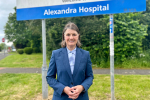
Rachel has welcomed a major NHS and Government plan to improve urgent and emergency care services, reduce waiting times and improve patient care.
Backed by a £1 billion dedicated fund, frontline capacity will be boosted further thanks to 800 new ambulances, including 100 specialist mental health vehicles, and 5,000 more sustainable hospital beds.
The two-year delivery plan was launched on Monday (January 30th) by Prime Minister Rishi Sunak in response to record demand for NHS services, driven by a number of factors including an ageing population with increasingly complex needs.
The two-year plan aims to stabilise services to meet the NHS’s two major recovery ambitions, to help achieve A&E four-hour performance of 76% by March 2024 and improve category two ambulance response times to an average of 30 minutes over the next year, with further improvement in the following year.
These ambitions represent one of the fastest and longest sustained improvements in emergency waiting times in the NHS’s history.
The Government is making up to £14.1 billion available for health and social care over the next two years, on top of record funding to improve urgent and emergency, elective, and primary care performance to pre-pandemic levels and to help alleviate the impact of inflation.
As part of the plan, urgent care provided in the community will be expanded to ensure people can get the care they need at home, without the need for a hospital admission.
These services will run for at least 12 hours a day – responding to calls normally requiring an ambulance crew – and will mean people who have fallen or are injured can get care and treatment at home within two hours.
Freeing up space in hospitals and speeding up discharge for those who are medically fit to leave are key parts of the plan, which will see pilots of a new approach to NHS step down care across the country – where patients will receive rehabilitation and physiotherapy including at home.
The success of ‘virtual wards’, where patients receive high-tech care in their own home is set to grow, with 7,000 virtual ward beds already in the community and up to 50,000 patients a month expected to benefit by the end of 2023/24.
Proven measures backed by clinicians and introduced as part of NHS winter planning will be expanded all year-round, with scaled-up falls response services and 24/7 system control centres 365 days a year, to help local areas track and quickly respond to pressures throughout the year.
Rachel said:
“Ensuring my constituents receive the first class healthcare that they deserve is a top priority for me and for this Government.
“I know urgent and emergency care services at the Alex and Worcestershire Royal are facing serious challenges, and the Government has launched a credible plan to fix this.
“We need this plan to work, and if we meet this ambition as the Prime Minister said, it will represent one of the fastest and longest sustained improvements in emergency waiting times in NHS history.”




